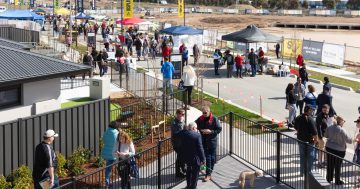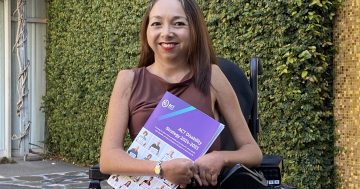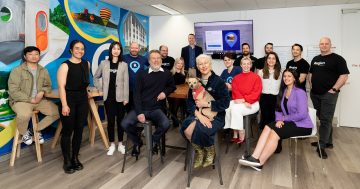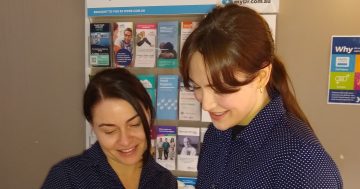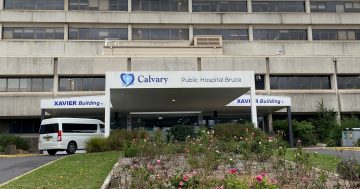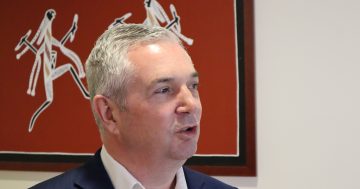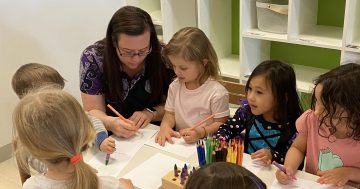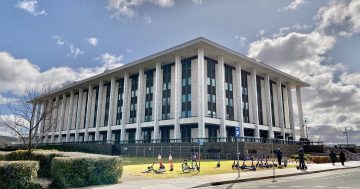
The first ever ACT Telstra Business Women’s Awards winner to go on to collect a national gong reckons the territory is on the verge of becoming an Australian leader in entrepreneurship.
“Canberra is set to challenge the rest of Australia in the startup ecosystem for originality, research and the perfect storm of the right government and private sector contacts being readily available,” Enabled Employment CEO Jessica May told RiotACT after collecting her National Telstra Business Women’s Startup Award this week.
The Canberra-born and raised businesswoman said the capital’s start-up ecosystem had been developing at a fast rate with support from the ACT Government and the ANU, Capital Angels and new accelerator programs.
“Chief Minister Andrew Barr is also personally very supportive of the startup and innovation sector in Canberra, and there are some brilliant incubators and ideas coming out of this community in the form of startups with the right support,” she said.
Family can also play a key role in nurturing our future entrepreneurs. Ms May nominates her mum as a key role model.
“My mother was an inspiration to me, she taught me to be a groundbreaker in my field, and an innovator,” Ms May said.
“She was one of the first female electronic engineers to qualify in Canberra.”
Ms May has won an impressive number awards before – a Prime Minister’s Award, the Innovation Award for Excellence in Public Sector Management, the Medicare Australia Achieving Excellence Award, the Robert Perry Memorial Scholarship at the Canberra Institute of Technology and an Australia Day Council Achievement Medallion – but was still completely surprised to be named the national winner in Melbourne on Wednesday night.
“I think there’s a video doing the rounds of social media of the look on my face when they read out my name, and my jaw literally dropped!” she said.
Enabled Employment (www.enabledemployment.com and www.soldieron.enabledemployment.com) is an online marketplace designed for people with disabilities and Australian Defence Force veterans, and is a privately-owned company funded by venture capital.
Among the reasons Ms May hopes big employers such as PricewaterhouseCoopers or Hewlett Packard Enterprises will look to her business is the fact that people with a disability make fewer workers’ compensation claims and take less sick leave.
“I made a public call in accepting the award to all employers to get on board with us, and we do not subsidise employers to provide work to people with a disability or ADF Veterans, we think their skills and abilities should be judged on merit, and work facilitated by flexible working conditions such as home-based work, results-oriented work environments, and the straight statistical facts – people with a disability make less workers’ compensation claims, take less sick leave, are more loyal, and work just as well given the right conditions as anybody else.”
Ms May said the support of Canberra start-up program the Griffin Accelerator had been invaluable to Enabled Employment in learning the ropes in the venture capital and innovation sector.
“The GRIFFIN CEO Dr Craig Davis has been a huge supporter of ours, and an investor in our business.
“With his guidance and counselling, we’ve taken all the right steps, and it’s not easy to convince employers a bunch of people with a disability will be a good investment as a startup!”
Enabled Employment is based on her view that employers should not be paid to offer a job to people with a disability.
In contrast with organisations like the Therese Rein-founded WorkDirections, Enabled Employment is not a Disability Employment Service provider and receives no government funding. (DES providers are subsidised to find work for people with a disability, and the employer providing the job is also subsidised for providing the placement.)
“What we are finding from our social media feedback and our research prior to starting the company is that once the subsidy runs out, so does the work,” Ms May said.
She said she believed in self-determination, and as people with a disability themselves, she and each of the members of the Enabled Employment team believed the government’s DES framework has got it wrong.
“We don’t provide subsidies to employers, and we receive no government subsidies from federal, state or local government. I guess that’s why we’re one of a kind as a business, and why we’re regarded as disruptive innovators in the industry.
She said that if her business could place all Australians with a disability in work, there would no longer be an expectation from employers that they should receive payment for ‘taking on’ a person with a disability – as though they were a troublesome charity case.
“We need to change attitudes about the worth of people with a disability as employees, and we’re getting great feedback from our employers on the successful candidates who have sourced work through our website.”
While Enabled Employment operates nationally, key team members including Ms May herself, the operations manager and media liaison/communications manager are based in Canberra, where Ms May grew up and where her children were born.
Ms May said the business was set up to allow flexible working and teleworking and that other staff were based in Adelaide and Melbourne.
“It’s also a major flexible work option for our cohort of potential employees, if you’re in a regional and remote area, all you need is a laptop and the internet, and you can earn a living by teleworking.
“Our employees can be located anywhere in Australia, and we are looking at expanding our operations to New Zealand, the United States, Canada and the United Kingdom.”
Ms May’s message for entrepreneurial Canberrans including those with a disability was around flexibility too. She became aware of how important this was after the birth of her first child, when her existing anxiety was aggravated by a thyroid condition.
“The most delightful thing about a startup is being able to work flexibly, from a co-working space such as Entry29, or home, or an office,” she said.
“This is a highly valuable flexible working option for people with a disability, as travel, for example, to and from work, can exhaust a person with Multiple Sclerosis or Chronic Fatigue, and decrease their ability to earn money through their business.”
She said private venture capital was hard to pitch for because such transactions were based purely on commercial arguments, but that there were ethical investors out there who would recognise the social change that business run by people with a disability could bring to the quality of life for 4.2 million Australians with a disability.
“No matter how hard it gets, don’t give up!” she said.
For more information on the Telstra Business Women’s Awards and the full list of the national winners, see www.womensawards.com.










